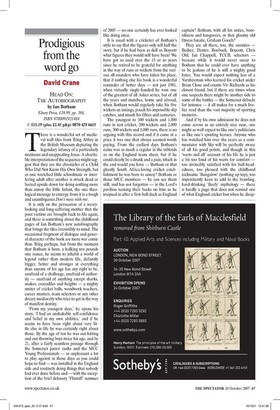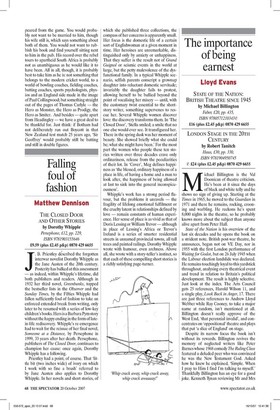Prodigious from the word go
David Crane HEAD ON: THE AUTOBIOGRAPHY by Ian Botham Ebtuy Press, £18.99, pp. 384, ISBN 9780091921484 £15.19 (plus £2.45 p&p) 0870 429 6655 There is a wonderful set of medieval wall tiles from Tring Abbey in the British Museum depicting the legendary infancy of a particularly mutinous and unappealing Jesus. A charitable interpretation of the sequence might suggest that they are the chronicles of a Child Who Did Not Know His Own Strength, but as one wretched little schoolmate or interfering adult after another is struck dead or buried upside down for doing nothing more than annoy the little Infant, the one theological message to emerge from it is a tough and unambiguous Don't mess with me.
It is only on the persuasion of a wearylooking and long-suffering mother that the poor victims are brought back to life again, and there is something about the childhood pages of Ian Botham's new autobiography that brings the tiles irresistibly to mind. The occasional fragment of dialogue and general character of the book are more war comic than Tring perhaps, but from the moment that Botham is born, a hulking ten pounds one ounce, he seems to inhabit a world of legend rather than modern life, defiantly bigger, better and stronger at everything than anyone of his age has any right to be, unafraid of a challenge, unafraid of authority — unafraid of anything except sharks, snakes, crocodiles and heights — a mighty smiter of cricket balls, woodwork teachers, career masters, team selectors or any other dreary mediocrity who tries to get in the way of manifest destiny.
'From my youngest days,' he opens his story, 'I had an unshakable self-confidence and belief in my own abilities,' and if he seems to have been right about very little else in life he was certainly right about those. By the age of ten he was out-hitting and out-throwing boys twice his age, and by 21, after a fairly seamless passage through the Somerset junior ranks and the MCC Young Professionals — as unpleasant a lot to play against in those days as you could hope to find — was installed in the England side and routinely doing things that nobody had ever done before and — with the exception of the brief delusory Tlintoff summer of 2005 — no one certainly has ever looked like doing since.
It is usual with a cricketer of Botham's style to say that the figures only tell half the story, but if he had been as dull as Boycott what figures they would still have been! We have got so used over the 15 or so years since he retired to be grateful for anything in the way of runs or wickets from the various all-rounders who have taken his place, that if nothing else his book is a wonderful reminder of better days — not just 1981, when virtually single-handed he won one of the greatest of all Ashes series, but of all the years and matches, home and abroad, when Botham would regularly take his five wickets an innings, pouch his impossible slip catches, and smash his fifties and centuries.
The youngest to 100 wickets and 1,000 runs in test cricket, 200 wickets and 2,000 runs, 300 wickets and 3,000 runs, there is no arguing with this record and if it came at a price it was one that always seemed worth paying. From the earliest days Botham's name was as much a regular in the tabloids as on the England team sheet, but if he could clearly be a drunk and a pain, which in the end would you have — Botham or that ghastly South Africa-loving cricket establishment he was born to annoy? Botham or those MCC members — he can see them still, and has not forgotten — in the Lord's pavilion turning their backs on him as he traipsed in after a first-ball duck as England captain? Botham, with all his antics, boorishness and hangovers, or that gloomy old fitness fanatic, Graham Gooch?
They are all there, too, the enemies — Bedser, Dexter, Roebuck, Boycott, Chris Old, Ian Chappell, TCCB, selectors — because while it would never occur to Botham that he could ever have anything to be jealous of he is still a mighty good hater. You would expect nothing less of a Yorshireman who learned his cricket under Brian Close and counts Viv Richards as his closest friend, but if there are times when one suspects there might be another side to some of the battles — the Somerset debacle for instance — it all makes for a much livelier read than the vast majority of sporting memoirs.
And if by his own admission he does not come across as an entirely nice man, one might as well expect to like one's politicians as like one's sporting heroes. Anyone who has watched him over the years as a commentator with Sky will be perfectly aware of all his good points, and though in this 'warts and all' account of his life he is just a bit too fond of his warts for comfort — too invincibly satisfied with his bull-headedness, too pleased with the childhood nickname 'Bungalow' (nothing up top), too impenitently keen to add to the brawling, hard-drinking 'Beefy' mythology — there is hardly a page that does not remind one of what England cricket lost when he disappeared from the game. You would probably not want to be married to him, though his wife still is, which says something about both of them. You would not want to rubbish his book and find yourself sitting next to him in the pub. His record over the rebel tours to apartheid South Africa is probably not as unambiguous as he would like it to have been. All in all, though, it is probably best to take him as he is: not something that belongs to the modern cricket world, to a world of bowling coaches, fielding coaches, batting coaches, sports psychologists, physios and an England side made in the image of Paul Collingwood; but something straight out of the pages of Thomas Carlyle — the Hero as Monster, the Hero as Prodigy, the Hero as Smiter. And besides — quite apart from Headingley — we have a great deal to be thankful for. Just think: if Botham had not deliberately run out Boycott in that New Zealand test match 25 years ago, 'Sir Geoffrey' would probably still be batting and still in double figures.








































































 Previous page
Previous page